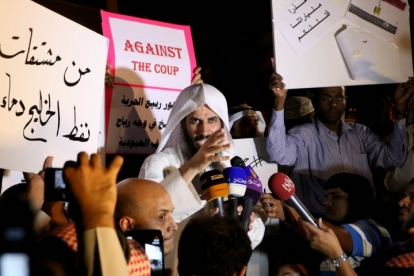IMAN Charman: 'Kuwait must do more to tackle extremism'
Sábado, 16 Agosto 2014
Kuwait regrets UN curbs against two citizens
KUWAIT NEWS
Kuwait regretted inclusion of two Kuwaiti citizens' names in the list attached to United Nations Resolution 2170 enforcing sanctions on extremist Islamic groups in Syria and Iraq.
In a statement to KUNA, the State of Kuwait's Permanent Delegate to the UN, Ambassador Mansour Ayyad Al-Otaibi, expressed regret for the decision of listing the names of the two Kuwaitis, as affiliated to the resolution, adopted on Friday. The UN resolution stipulated stringent curbs on the Islamic State in Syria and the Levant (ISIL) and Iraq and the Nusra Front (ANF).
Kuwait will abide by the UN Resolution 2170 and implement all its terms, affirmed the Kuwaiti envoy, in a statement to KUNA following a Security Council session.
Kuwaiti laws prohibit citizens from being involved in illegal activities, criminalize direct or indirect affiliations to any terrorist organizations and respect international obligations, said the Kuwaiti delegate to the UN, after the Security Council adopted the resolution demanding that the ISIL, the ANF, all other individuals, groups and entities associated with Al-Qaeda "cease all violence and terrorist acts, and disarm and disband with immediate effect." Elaborating, Ambassador Al-Otaibi stated that Kuwait had amended some of the legislations and laws to render them more compatible with international treaties and accords.
Moreover, the State of Kuwait fully adheres to implementation of Security Council resolutions, in line with the UN Charter, namely provisions 24 and 25, he said.
On the enlisting of the two Kuwaiti citizens, Hajjaj Bin Fahd Al Ajmi and Hamid Hamad Hamid Al-Ali, to be penalized with travel embargo and assets' freezing, among other measures, Ambassador Al-Otaibi said their enlisting would not be permanent, "for there are certain mechanisms that regularize listing and omitting names of the suspects particularly when proven innocent of the charges of having links with terrorist organizations." Kuwait, in the past, succeeded in persuading Council member states to remove the "Islamic Daawa" from an identical list, after providing proofs that it had no links with any terrorist organization.
The State of Kuwait supports the international community in combating all forms of terrorism and will cooperate with it in full, he said, noting that Kuwait will not oppose to any council decision.
Concerned Kuwaiti citizens can file a plea with the sanctions committee and provide proofs of not having such affiliations
Kuwaiti Sunni Cleric Accused of Fundraising for Isis Briefly Detained
IBI TIMES
Kuwait briefly detained a Sunni cleric who is suspected of channelling funds to Islamic State (Isis) militants by the US, according to his lawyer.
Shafi al-Ajmi was freed after four hours of questioning.
"He was released without any charges. He's now at home," Al-Ajmi's lawyer, Mohammed al-Jumia, told Reuters.
The US placed sanctions on Shafi, and other two Kuwaitis suspected of funnelling money to the Sunni fighters in Iraq and Syria.
"Through fundraising appeals on social media and the use of financial networks, Shafi al-Ajmi, Hajjaj al-'Ajmi, and al-'Anizi have been funding the terrorists fighting in Syria and Iraq," David Cohen, undersecretary of terrorism and financial intelligence, said in a statement.
The US-allied Gulf Arab state has been accused of being a "permissive environment for terrorist fundraising" and described as a "virtual Western Union", by a New York Times report.
Shafi was banned from a TV show in Kuwait for inciting hatred. He called on supporters to torture and kill fighters in Syria linked to Hezbollah, a Lebanese Shi'ite militant group.
US accuses Kuwaiti minister
The Sunni cleric is also cited by New York-based Human Rights Watch for creating a fundraising network that led to the mass execution of Alawite villagers at the hands of Islamist fighters, which is considered war crime.
Kuwait has increased its monitoring of individuals and groups suspected of collecting money for al-Qaida linked militants in Syria and Iraq after US complaints.
In April, the country's justice and Islamic affairs minister, Nayef al-Ajmi, who is of the same tribe of Shafi, rejected American claims that he called for a violent uprising in Syria and raised money for terrorist activities.
Nayef al-Ajmi described the accusations as "baseless and groundless", according to Kuna news agency. His comments came after Cohen said the Kuwaiti minister had a "history for promoting jihad in Syria" and that images of his face had been used on fundraising material for the Al-Nusra Front - an Al-Quida linked organisation operating in Syria and Lebanon.
The kingdom of Kuwait has donated more than $70m (£42m, €51m) to United Nations fundraising appeals, while many millions more have been channelled to support refugees through private donations.
Responding to the news, IMAN Chairman, Ribal Al-Assad said:
"These individuals must be held to account for their actions, they must be brought to justice immediately and Kuwait must show that it is ready to take tackling extremism seriously.
This is only the first step in fighting terrorism in Kuwait, the region and the world. It is impossible to claim that we are fully fighting extremism if we don't start by bringing all those who have incited and continue to incite, fund, arm and recruit terrorists to justice.
With this in mind, It is simply not enough for the Minister of Justice to step down, he must face the courts and be held accountable for his actions.
The Kuwaiti government must take immediate action to show that it is taking measures against these individuals, justice must be served.
Only a united effort between nations will stop the rise of extremism and every country must play its part."